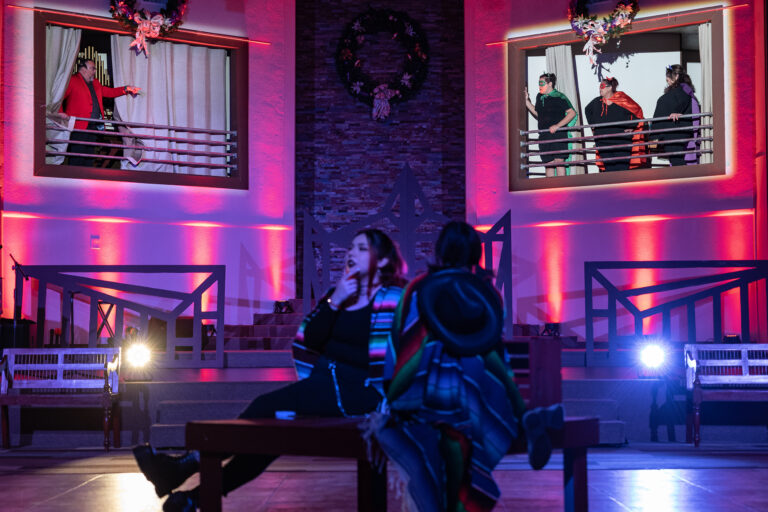Two holiday productions bring San Antonio culture to the fore, bridging European traditions with Mexican American cultural expressions.
Dec. 17-18, the San Antonio Chamber Choir will present El Mesías, a Spanish translation of Handel’s treasured masterwork and holiday classic Messiah, and Dec. 19-23 Teatro Audaz will perform La Pastorela Audaz, a traditional Mexican Christmas story, this time told from the shepherd’s perspective.
El Mesías
The roots of El Mesías run deep into Chicano culture.
Chamber Choir director Roland Barrera had heard of a bilingual presentation of Handel’s Messiah done in 2018 by Border CrosSing, a Minnesota choral ensemble devoted to presenting classical music to Latinx audiences.
Border CrosSing was founded by Ahmed Anzaldúa, a nephew of famed Chicana activist and writer Gloria Anzaldúa. In describing his purpose for adapting a European classic for a Latinx audience, Anzaldúa said in a 2019 blog post, “There is a misconception that this kind of music is not for Latin Americans; that it will fly over our heads; that we won’t understand; that we get mariachi, but we won’t get Mozart.”
Barrera then learned of other translations, including by the Bach Collegium San Diego and Boston composer and educator J. Andrés Ballesteros of the Eureka Ensemble. Ballesteros responded to Barrera, offering his El Mesías for the Chamber Choir’s collaboration with the Children’s Chorus of San Antonio and local instrumentalists.
Barrera said presenting the Spanish adaptation would be a way to honor Spanish-speaking residents. “I thought that it would be a good fit for a city like San Antonio … taking a time-treasured masterwork, and reimagining it with a tongue and a dialect that is so close to so many people here.”
Ballesteros first revisited the original Messiah libretto by Charles Jennens, then went beyond a literal translation to get closer to the spirit of the biblical verses Jennens drew upon, researching the Reina-Valera Spanish Bible translation of 1602.
“It has that same slightly dated language that I think is part of the magic of Messiah,” Ballesteros said. But the Spanish presented challenges, given the differences in sentence structure and pronunciation between the two languages. For example, a lyric line might be twice as long in Spanish, which required adapting the music to fit.
“I acknowledge the power of [Handel’s] Messiah, but I don’t want to be too precious about it,” Ballesteros said. “It is a translation, but it’s also an arrangement. And that means that there are a number of places where I took liberties with the rhythm because I felt like the meaning of the text was more important.”
An abridged online version by the Eureka Ensemble from 2021 includes a children’s chorus and the glorious “Hallelujah Chorus” that has made Handel’s work so memorable.

As a Mexican American, Ballesteros said he relates to the immigrant story of Handel, a German who relocated to England. Though he was born in Kentucky, his Mexican parents moved back to their home country when he was three months old, then moved back to the U.S. when he was age seven. “So I’m in this in-between land,” he said.
One point of consistency was sharing experiences with Latino communities wherever he’s lived, Ballesteros said, and those experiences played into his work on El Mesías.
“In doing the translation … I was falling back on my childhood experiences, using the stock phrases that I know are used at church every Sunday,” drawn from the Reina-Valera biblical verses.
Teaching commitments will keep Ballesteros from visiting San Antonio for the Texas debut of El Mesías, but he said “the fact that it is going to be performed for a Mexican American audience is really exciting” for him.
“I’m the Mexican American kid who grew up here listening to classical music in addition to mariachi music and what else have you, and I’m just really excited that this work is going to be shared there.”
Tickets for Saturday evening and Sunday afternoon performances of El Mesías are available on the San Antonio Chamber Choir website. The choir will perform in the Immaculate Conception Memorial Chapel at the Oblate School of Theology, and an event program will include lyrics printed in English and Spanish.
La Pastorela Audaz
Harlandale High School theater teacher AnaLisa Leos-Garcia is a former board member and performer with Latinx theater company Teatro Audaz.
Leos-Garcia recalls watching Teatro Audaz’s annual holiday pastorelas, generally traditional tellings of the Nativity story. Having written plays and scenes for her students, she had the idea of adapting the traditional tale for modern times.
“I wanted to give the traditional folktale an update,” she said. She started workshopping a script with her students, then presented it to Teatro Audaz for this holiday season.
Her students are the inspiration for her Latinx-focused plays, Leos-Garcia said, because of the importance of “seeing youth identifying with these scripts, because it’s reminding them so much of their family members, their relatives and their own traditions.”
Her La Pastorela Audaz retains the traditional story of three shepherds journeying to visit the newborn baby Christ in Bethlehem, but in her comedic telling, “these pastores are Tiktok influencers,” and some cast members play demon luchadores trying to keep the influencers from reaching their goal.
In their drama of good versus evil, the influencers lead with kindness, she said. A children’s choir will bring the message home with classic holiday songs, including “Feliz Navidad,” “Oh Holy Night,” “We Three Kings,” and “Mi Burrito Sabanero,” which tells the story from the donkey’s perspective.
“We want the audience to leave feeling that holiday feel,” Leos-Garcia said. “Whether you are religious or non-religious, the play will resonate with this idea that we all need to treat each other with kindness and compassion.”
Tickets are available for performances of La Pastorela Audaz at the Woodlawn Pointe Auditorium, running at 7 p.m. each evening Dec. 19-23.




